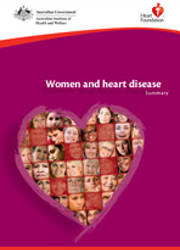Summary
This summary report provides key findings from the main report Women and heart disease: cardiovascular profile of women in Australia, which describes the current impact of cardiovascular disease on Australian women. This report has been prepared to:
- provide a baseline picture against which future monitoring can be compared and assessed
- provide evidence that dispels the perception that cardiovascular disease is not an important threat to Australian women.
The key findings
Cardiovascular diseases are a major threat to the health of Australian women
- More than one in three women who died in 2006 did so as a result of a cardiovascular disease.
- Many of these deaths were premature, with cardiovascular disease responsible for more than one-quarter of premature deaths in women. In particular, coronary heart disease and stroke were the two leading causes of life lost to premature death for Australian women in 2003.
- About two million Australian women (one in five) have cardiovascular disease. About 226,000 of these women have coronary heart disease, 168,000 have had a stroke and 176,000 have heart failure.
- Coronary heart disease and stroke are in the 10 top causes of poor health and disability among Australian women.
Implications for the Australian health system
- Cardiovascular disease is a real burden to the health system, ranking second in terms of health expenditure on women—$2,682.8 million was spent treating cardiovascular disease in women in Australia in 2004-05.
- Cardiovascular disease is responsible for a significant proportion of general practitioners' workload. In 20% of general practice visits by women, at least one cardiovascular disease problem was treated. And about 200,000 admissions to hospital (5% of the total) for women related to cardiovascular disease in 2006-07.
- 36.5 million prescriptions for cardiovascular medicines were dispensed for women through the Pharmaceutical Benefits Scheme and Repatriation Pharmaceutical Benefits Scheme in 2007-08. This accounted for 52% of the total Pharmaceutical Benefits Scheme and Repatriation Pharmaceutical Benefits Scheme prescriptions filled for cardiovascular medicines.



